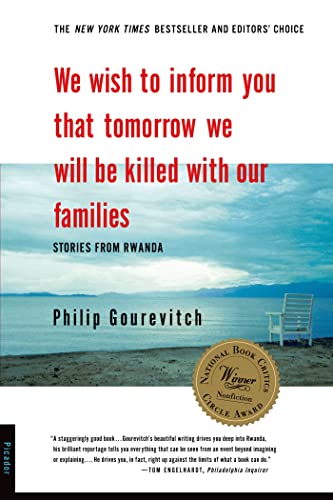We Wish to Inform You That Tomorrow We Will be Killed With Our Families
Stories from Rwanda
Philip Gourevitch
BOOK REVIEW

The haunting title, We Wish to Inform You That Tomorrow We Will be Killed With Our Families, draws you into a world drenched in despair, yet it is precisely this bleakness that compels you to read on. Philip Gourevitch's piercing exploration of the Rwandan genocide is not merely a recounting of events; it is a profound meditation on humanity's capacity for cruelty and the haunting scars that linger long after the violence subsides.
Gourevitch's narrative is woven from a tapestry of personal accounts, horror-laden facts, and poignant reflections that create an unflinching portrayal of a society on the brink of annihilation. We are not just passive observers; we become embroiled in the visceral screams of a people shattered by unimaginable brutality. This is a book that doesn't shy away from the grotesque realities of the human experience. It demands that you confront the uncomfortable truths hidden under the surface of our global conscience.
Through the lens of the Rwandan tragedy, Gourevitch crafts a narrative that reverberates with the urgency of remembering. He navigates the chaotic aftermath of 1994, when nearly a million Tutsis and moderate Hutus were slaughtered in a span of 100 days, and forces us to grapple with the moral implications of silence and inaction. Are we not complicit in the atrocities we choose to ignore? The author prods with relentless questions, imploring us to examine our own role in the fabric of global morality.
Readers express their profound emotional responses to Gourevitch's tales, swinging from deep sorrow to uncompromising outrage. Some find an unsettling kinship with the survivors' stories, while others are left questioning the very nature of humanity. The critiques are sharp: some argue the book's focus on individual experiences at times oversimplifies broader geopolitical complexities. Others passionately defend it as a necessary lens through which we understand the human cost of indifference.
As you delve deeper, Gourevitch's prose astonishes not just for its clarity, but for the raw emotion it conveys. His depiction of mundane moments juxtaposed with horror-like the courageous acts of love and defiance against a backdrop of chaos-transports you directly into the heart of Rwanda. You are left grappling with images of humanity's worst excesses balanced against flickers of resilience. This duality, stunningly rendered, helps elicit a response that is both pained and hopeful.
What resonates most is an urgent call to action. In a world where echoes of genocide still ring alarmingly close, Gourevitch's work reminds us of our obligation to bear witness. By sharing these stories, he flicks the switch on our moral compass, forcing us to reassess our engagement with human rights issues worldwide. The haunting narratives compel you to confront your own silence. The question remains: what will you do when faced with such stark reality?
In reflecting on Gourevitch's impact, one cannot overlook his role in shaping discourse around collective memory and accountability. His influence reaches beyond literature, sparking conversations in political arenas and humanitarian efforts. By illuminating the darkness of Rwanda, he has shone a light on the path forward for societies still grappling with their own histories.
We Wish to Inform You That Tomorrow We Will be Killed With Our Families is not merely a book-it is an essential experience. It challenges you to feel, to think, and to act. In navigating the delicate interplay of memory, trauma, and hope, you'll find yourself transformed, compelled to join the ranks of those who refuse to let history repeat itself. The time for action is now, and this book is a starting point. 🌍✨️
📖 We Wish to Inform You That Tomorrow We Will be Killed With Our Families: Stories from Rwanda
✍ by Philip Gourevitch
🧾 356 pages
1999
#wish #inform #that #tomorrow #will #killed #with #families #stories #from #rwanda #philip #gourevitch #PhilipGourevitch